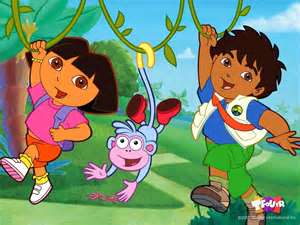Linda Christensen explored more deeply on how children’s entertainment affects their view of the world around them. I have to say I never thought about the influence cartoons gave to me until now. As a little girl I taught “if is made for children it has to be good and educational”, but never realized how unconsciously can shape your way of thinking growing up; especially when you are a little girl. For example watching Cinderella, Snow White, just to mention a few, portraying beauty as being good and the ugly as being bad (physically). Like this situation, most children are likely to imitate what they see on television because children tend to think that their favorite characters are heroes or role models at some point, so they want to act and speak like them. Applying the: "monkey see, monkey do" analogy. Christensen points out Tatum’s research suggestions: “the stereotypes and worldview embedded in the stories become accepted knowledge”.
Furthermore, we can’t forget that there are movies and cartoons that have a good moral to the story, and children can learn about numbers, letters, colors and shapes by watching quality educational programs; such as Sesame Street and Blues Clues, it seems as though they are geared toward teaching the viewer’s skills and overall about social interaction.
Another point I will like to make is that nowadays, most parents work, so they do not have enough time to be with their children and play with them for most of the day; which inevitably most children spend time watching cartoons in other words “too much TV and not enough family time”. This can lead these children to be exposed to advertising that can lead on making the wrong choices.
As parents our future ones we are the responsible ones on how we going to “educate and raise our children” also remembering the famous concept of “Nurture vs. Nature”.


i like that you pointed out the monkey see monkey do line because when we allow a world to be run that way then who will ever challange it?
ReplyDelete